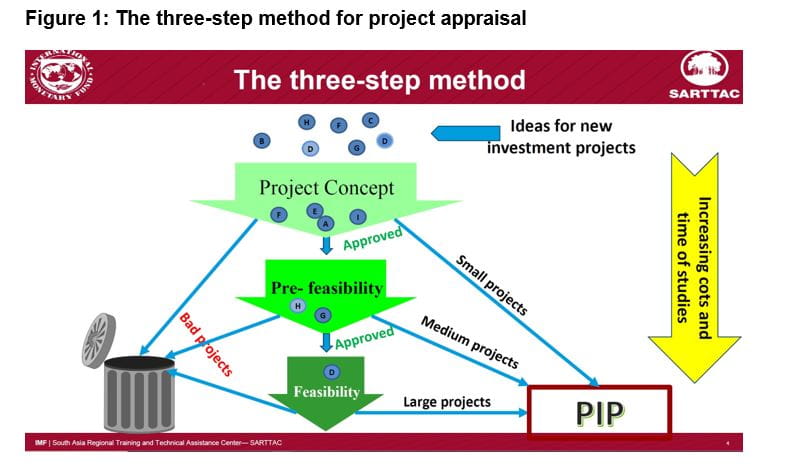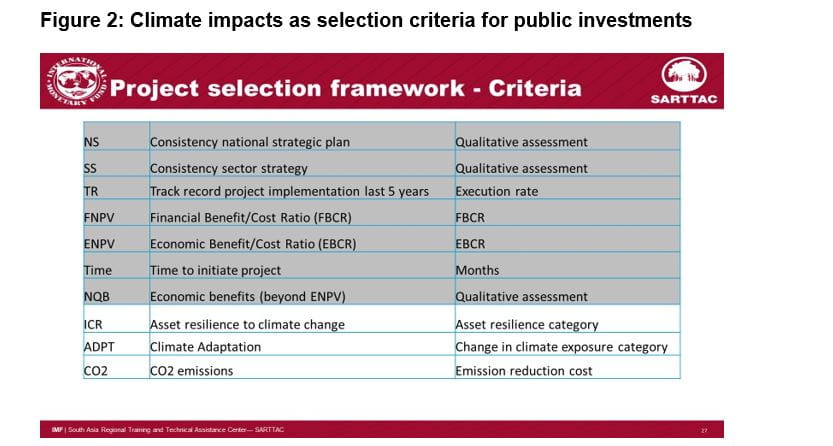In January 2024, IMF’s South Asia Regional Training and Technical Assistance Center (SARTTAC) delivered training to staff from the Bangladesh Planning Commission (PC) and other ministries on Climate-sensitive Public Investment Management (PIM). The workshop included experts from IMF’s Fiscal Affairs Department and provided an overview of good international practices for climate sensitive-public investment planning, appraisal, and selection and their application to Bangladesh.
Public investment is a high priority in most low-income and emerging economies, and countries are increasingly working to incorporate the climate aspects of their investments in project appraisal and selection mechanisms. The Bangladesh workshop demonstrated approaches that should be of interest for many other countries.
The training was designed to reflect the findings of Public Investment Management Assessment (PIMA) 2018 for Bangladesh and address the weaknesses identified in that assessment, with due consideration of recent improvements. The PIMA 2018 had found that while the formal requirements for public investment management were strong in several areas, actual practices were lagging behind. There has been notable progress since 2018 and the workshop provided practical guidance on steps to further strengthen the effectiveness of public investment, including to implement existing and new regulations. The participants were provided several examples of international experience and practical approaches to update their practices, including various exercises.
Discussions regarding project development and appraisal were a key part of the workshop, and emphasized the importance of applying a phased approach, such as the three-stage method described in figure 1. This approach differentiates the requirements for projects of different size and complexity, to ensure that projects that are unlikely to meet the selection criteria are discarded at an early stage, that small and simple projects can be approved quickly and that large and complex projects are subject to rigorous appraisal. The project development process should be separated from the budget process, to allow sufficient time for systematic analysis, and the PC should be involved in the decision process at each of the three stages.
This repeated engagement will give the PC in-depth knowledge about the larger projects and help them be effective gatekeepers to the Public Investment Program (PIP). It is also critical that PIP decisions have a medium to long-term perspective and are not limited to next year’s budget.
The workshop also covered how to introduce climate considerations in public investment management. There is currently no regulatory framework or methodological guidance on this topic in Bangladesh.
While project proposals may include some climate-relevant information, there is no systematic consideration of climate impacts in project planning, appraisal and selection. The workshop provided practical examples of how this can be achieved, including through hands-on exercises. The discussions focused on three key interactions between climate change and public investment:
- The climate resilience of the specific asset being constructed
- The investment project’s impact on the climate resilience of a geographic area or class of beneficiaries
- The greenhouse gas emission impacts of the investment project
The workshop discussed how to identify, how to quantify and how to value each of these three climate aspects. There will often be information gaps, but these can to some extent be alleviated by using qualitative judgement to define indexes. Figure 2 gives an example of how information about climate change impacts can be used in a project selection mechanism. The next step would be to assign weights to each parameter and to score potential projects against each criterion.
The workshop participants agreed that it would be useful to have a follow-up workshop in the fall, combined with more in-depth discussions of the planned regulations regarding medium-term public investment planning and methodologies for climate-sensitive public investment.








